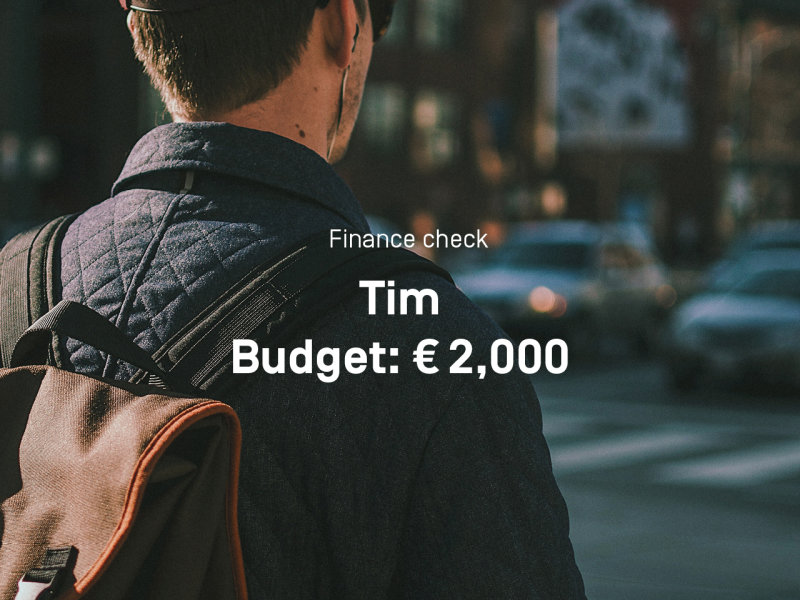How much money he has at his disposal each month, how he organizes his finances and what kind of an effect unemployment is having on his savings goals: Tim reveals all of this and more in our Finance Check.
How much money do you have at your disposal each month? How are you saving for your retirement and which financial goals have you set yourself? Find out the answers to these questions in the latest instalment of our Finance Check with Tim.

How high is your monthly (net) budget?
I have a monthly budget of €2,000 a month, my unemployment allowance from the job center. Before I became unemployed, I worked as a controller.
Are you renting or buying the place where you live?
I share a 115 m² flat with two others in Hamburg. What I love most about Hamburg is the variety of things to do and places to go, the hustle and bustle and the fact that I don’t need a car to get around on a daily basis.
What’s the breakdown of your monthly outgoings in fixed costs and variable costs?
My fixed costs add up to €830. That includes €630 on rent and €130 on various insurances. And I spend €70 a month on other fixed costs such as subscriptions or account fees. As far as my variable costs go, I spend around €500 on going out and eating at restaurants, €300 on groceries and €240 on other things like clothing, going to the cinema or trips. And I also invest €130 each month.

When you see the breakdown of your finances, does it surprise you or do you check your spending and income regularly?
I regularly check my spending by keeping a close eye on my account balance, i.e. the ratio of my income to my expenses, because I want to make sure that I’m not spending too much. Despite that, the amount I spend on nights out and eating at restaurants surprised me. In the future I plan on eating out less and increasing the amount of money I save instead. My goal is to save at least 20% of my income.
How do you organize your finances to keep track of everything?
I have two current accounts, one for all my fixed costs and one for all other expenses. Plus, I have one instant access savings account for short-term savings goals (vacations etc.) and one where I have put three net monthly wages aside for emergencies. I’m currently saving €130 every month, €50 of which goes into an investment fund savings plan and €80 into a private pension insurance plan. I haven’t kept a budget book so far, but I’d like to do that in the future to help me keep my regular variable costs under control better – and also to reduce them. This would mean I could increase the amount of money I save and invest more in my retirement needs.
How are you making provisions for your old age or saving up for bigger dreams for the future?
I’m currently paying small amounts into a private pension insurance. But I’d actually like to cancel this insurance plan because it won’t give me much of a return in the long term. Instead, I want to invest in a free investment fund. But this probably won’t be enough to fill the gaps in the state pension that I will be entitled to. I used to put a bit of money aside each month in my instant access savings account to save up for bigger goals and dreams, but that’s not possible at the moment because I’m out of work.
What is particularly important to you when it comes to money?
When it comes to money, it’s particularly important to me to be in control of my own finances and have direct access to them. In the long term, I really want to build up a financial cushion. That will make it possible for me to maintain my current standard of living when I’m retired and to carry on travelling, eating at restaurants and enjoying leisure activities.
As well as the money itself, financial expertise is also unequally distributed – and one facilitates the other.
Money is a very important subject, as it affects almost all areas of our lives. If you don’t keep a close eye on your own finances, it can negatively affect other areas of your life. If you build up debts, for example, don’t save up enough for your retirement, or if you lose money through dubious investment schemes. As well as the money itself, financial expertise is also unequally distributed – and one facilitates the other. That’s why I think financial education for everyone is so important.
What do you wish you’d known sooner about money and finances?
I was very late to realize how important it is to regularly set aside savings over a long period of time. I wish I’d learnt about capital markets earlier on and also started investing money a lot earlier too. Organizing my finances over multiple accounts is so convenient – I wish I’d started doing that a lot earlier as well.
Find out more
Anyone can be good with money? That’s right!
Tax returns in Germany: What you need to know
The 752 rule: Recognize saving potential with this rule of thumb and put money aside for the future
